- Home
- Elizabeth Goudge
Gentian Hill Page 10
Gentian Hill Read online
Page 10
Coming around the bay from Torquay, sandstone cliffs and pasture land edged the sea with a ribbon of red and green, and in the Helds between Torre Abbey and the sea, the deer were feeding behind the strong sea wall that George Carey of the Abbey had built to protect his land. Stella could just see the Abbey among its trees, with Torre Church and the Chapel of Saint Michael looking down upon it from their hills. The hamlet of Livermead had its ancient jetty running out into the water in the center of the bay, just where once upon a time a forest had been submerged by the sea. Stella was always thrilled by the thought of this forest, and sometimes when she was awake at night she would tell herself stories about it. She wondered if there had been a little chapel in the forest, like the Chapel of St. Michael above the Abbey, and if on stormy nights you could hear the bell in its belfry ringing. In Torre Abbey sands you could still see the roots of trees at low water, and to this day the fishermen
would bring up the antlers of deer in their nets. From the cluster of cottages that was Livermead two lanes wound through fields and coppices, one to Cockington and the other to the village of Paignton to their left. Paignton was much older than Torquay, and looked upon the lovely little place with its flowery Strand as a mere upstart. Paignton was famous for several things-its cabbages, its beautiful fifteenth century church, and the Palace of the Bishop of Exeter standing in a great meadow beside the church, with sheep cropping the turf beneath its windows. Some people said Miles Coverdale, Bishop of Exeter, had made his translation of the Bible there, but whether he had or not, it was a place of tranquillity and peace, and so was the old harbor with thatched cottages clustered about it.
"The sea looks so gentle," said Stella at last. “You wouldn’t think, would you, that it could turn black and cruel and drown people?"
The doctor looked at her keenly, then touched up his horse and they moved on down the lane.
"Where are we going?" asked Stella.
"I’ve a patient to see at Torre Abbey," said the doctor.
"Torre Abbey!" cried Stella. It was the greatest house in the neighborhood, greater even than Cockington Court. It was to Stella as though he had said that they were going to Windsor Castle. “Are Sir George or his lady ill?"
"They would not call in this country sawbones if they were," laughed the doctor. "Nothing so grand as that, my honey. They’ve a footman who once upon a time was shipmates with me. He’s ill and suffers from the delusion that I’m the only man who can put him on his feet again. I was useful to him once before, when we were both with Nelson in the Agamemnon, and he was blown sky-high at the siege of Bastia. I doubt if he’s ever got over that, poor fellow."
He paused. He never spoke to Stella of the horrors of war, but he had done so this time with a purpose, for after what she had said about the sea he had hazarded a guess at what had saddened her.
“Is it very dreadful to be blown sky-high?" she asked in a clear, strained voice.
So his guess was right, and she had been told about her mother. He looked at her anxiously. Her face looked pale against the background of the simmering sea and the blue sky, and he was extremely angry. She had been told much too soon. He had many times asked Mother Sprigg not to tell her until she was at least twelve years old, but Mother Sprigg, jealous of his influence over Stella, had always replied obstinately that she was the best judge as to when Stella should be told what. He said nothing until they had reached the bottom of the hill and were jogging along the lane that led through meadows and woods to the Abbey, and then he said,
“So you know about your mother, Stella?"
Stella nodded, aware of his compassion inviting her confidence and glad now to give it. "I asked Mother Sprigg.
Somehow, I felt that I wasn’t really Mother Sprigg’s daughter. I could remember other things. And so I asked."
"And when you heard about your real mother you felt unhappy, didn’t you?"
“I did not feel so bad at first. But afterwards, when I’d seen Zachary Moon, and he’d gone away again, and I’d gone to bed, it all seemed real." She fumbled a little desperately for words. "As though I was them. Only it was worse when I couldn’t be them."
“‘Who is Zachary Moon?" asked the doctor.
Stella told him all about Zachary, not about him seeming like the other part of herself, for she could not find the words to explain that part of it, but the actual story part. The doctor had trained her to tell a story well, and she did not leave out anything from the rising of Hodge’s hair beneath her hand to Zachary limping away into the night.
“Away into the darkness, like your mother," said the doctor gently, when she had finished. "To somewhere outside the life you know about where you cannot follow them or be them any more. And it is worse, is it, not to be them than to be them?"
Stella looked up at him, nodding, wide-eyed with amazement that he should understand so well. He rubbed his broken nose, wondering how best to help her. "I think I know how you feel, my honey. If you know what is happening to people, you can be them in your mind and can keep them company. But when they have gone to some place where you don’t know what is happening to them, you can’t. But you don’t have to know just what people are doing and feeling to be of assistance to them. Your own life seems to you like a very small lighted room, with great darkness all around it, and you can’t see out into the darkness and know what is happening there. But light and warmth from your room can go out into the darkness if you don’t have the windows selfishly curtained, keep a brave fire burning, and light all the happy candles you can. Do you see what I mean?”
Stella nodded slowly. "Yes. You mean my mother will be happier if I’m happy?"
“That’s what I mean. And this Zachary Moon, and all other misfortunate vagabonds, will feel more valiant if you are keeping your courage up. You may think that sounds fantastic, but it’s the truth. Were you whipped for feeding the young scrounger?"
Stella had not known that he had noticed her bandaged hand. But of course he had noticed. He always noticed everything. "I asked Father Sprigg to whip me instead of keeping me away from lessons. He didn’t want to do it, but he did."
The doctor nodded approval of both Stella and Father Sprigg.
"But Zachary isn’t either a vagabond or a scrounger," she went on.
"What is he then?" asked the doctor. He was feeling his way to some knowledge of this Zachary, who was so mysteriously the boy from the moon whom the little Stella of three years ago had wanted as her playmate, and had used the words vagabond and scrounger as a draw.
“He was ragged, but you could see that he wasn’t used to being that way, and he asked me to give him my handkerchief because he was not clever at blowing his nose without one, the way old Sol is. And he only asked for food because his stomach was sticking to his backbone and he just had to ask for it. He didn’t ask for money; scroungers always ask for money. And when he ate, it wasn’t like Sol and Madge eat, or even Father Sprigg, it was like, well, the way you eat." She surveyed him thoughtfully, then nodded. "Yes, he was like you. ’
"What, with a broken nose and an eyeglass and a wrinkled countenance?
"No, not like you to look at." She puzzled over it, then pounced upon the resemblance. “You could trust him. Hodge knew it, and stopped growling and wagged his tail almost at once, but I think I’d soon have known it, even if Hodge hadn’t been there. You know how one feels with people like you and Zachary safe."
The doctor took off his hat in acknowledgment of the prettiest compliment he had ever been paid by a lady, and he considered that he now knew enough about Zachary to enable him to keep an eye open for that unfortunate young gentleman for whose acquaintance he found himself increasingly eager. Abruptly he changed the conversation. "Now, my honey, no more grieving. Whatever your mother suffered, it’s over and done with long ago. She’s happy where she is and will be the happier for your happiness. And as for this Zachary, he appears to be an exceptionally gifted young gentleman, perfectly able to possess himself of a meal and a hand
kerchief when required, and will undoubtedly fall upon his feet sooner or later, and I’ve told you how to be useful to him in the meantime .... There’s the Abbey. Have you ever heard the story of its building?"
Stella looked up, shaking her curly head, lights in her eyes again at the prospect of a story. They were now in the fields where from above they had seen the deer feeding, and the road wound under oaks and beeches, stalwart giants of trees who were yet bent all one way by the wind from the sea. To their right they could see through the trees the strong wall that kept back the sea when the winter storms were raging, and to their left and ahead of them was the Abbey embowered in trees, the more modern manor house surrounded by the old monastic buildings, the gatehouse, the old barn, the tower and ruins of the church, with orchards beyond and then the Chapel of St. Michael keeping watch over it all upon the hill beyond the orchards. That Chapel drew Stella especially, almost as though it belonged to her.
2
"Once upon a time," began the doctor in the approved style, "in the days of Richard of the Lion Heart, a man and a girl lived in these parts and loved each other. He was Hugh de Bruiere, the descendant of a Norman knight who had settled here after the Conquest, and she was Lady Hester of the House of Ilsham, who lived in an old castle over there beyond Torquay. They promised to be faithful to each other and then he went away to the Crusades and she sat in her bower at the castle at Ilsham looking out to sea and telling her beads for his safe return. But de Bruiere was not the only man who loved her; there was another fellow, de Pomeroy, who lived in Berry Pomeroy Castle in the woods beyond Weekaborough Farm, a fellow who was not trustworthy like Zachary Moon. He had gone to the Crusades too, with Hugh de Bruiere, and a year later he turned up at llsham, having been entrusted by de Bruiere with a message for Lady Hester. But he did not give the message. Instead, he told a long cock and bull story of de Bruiere’s death at the hands of the Saracens, and the Lady Hester believed him. Then he made furious love to her, and a year later they were married."
"Well!" exclaimed Stella indignantly. "You’d have thought she’d have had the sense to know he was lying, wouldn’t you?"
"Telling her beads so often, and looking at the sea so long, must have addled her brains," said the doctor, finding what excuse for her he could. "Doubtless a feather-pated girl at the best of times and easily persuaded. Well, as I say, she married de Pomeroy, but on the wedding night a ship sailed
into Torbay and dropped anchor, a boat was lowered, and a knight came ashore.’
"Hugh de Bruiere!" said Stella breathlessly. "The very same. He saw the blaze of lights at Ilsham and asked the fisherman its meaning. What he said, when told of its meaning, is not recorded, nor does anyone know exactly what happened after that, but de Bruiere was a hot-tempered man, and next day the body of de Pomeroy was found in the river Dart with a dagger sticking in it. It was very regret table, no doubt, but I’ve every sympathy with the fellow, haven’t you?"
Stella nodded vehemently. "And then Lady Hester married him?" she asked eagerly.
The doctor chuckled. "You’d have done that, wouldn’t you? So would any girl of spirit. But Lady Hester seems to have been poor spirited as well as feather-pated. She fell into a decline, and not having me at hand to get her out of it, presently died."
"And what did de Bruiere do?"
"Like most of these hot-tempered gentlemen, who act first and think afterwards, he wished he had not been so hasty. He wished it so often and so much that presently he began to suffer from that uncomfortable condition of mind known as remorse. But being a sensible man he did not, like his lady, fall into a decline, but set to work to do something practical in expiation of his sin. The countryside, he knew, was full of ignorant poor folk with no one to teach them, or help them when they were ill or in trouble-full, too, of thieves and swindlers, and hot-tempered persons like himself who were far too ready with their daggers on a dark night. The more he thought about it, the more he saw that what they needed was the presence among them of holy men who would teach the ignorant, nurse the sick, comfort the sorrowful, and put the fear of hell fire into sinners like himself. He was a wealthy man, and had brought back further wealth from the Crusades. He decided to build and endow a monastery.
"He chose his spot well, this level space of green fields in the center of this lovely bay, and presently the countryside was humming with activity. Masons were summoned from far and near, carpenters, carvers in wood and stone. The axes rang in the woods as the Spanish chestnut trees were felled for the great timber roofs, and in the quarries the quarrymen made a great clamor hewing the stone for the walls. Along the narrow miry lanes the sledge wagons with their teams of straining horses went back and forth. It was all finished at last; the Abbey Church, the great barn, the cells for the monks, the cloister, library, and kitchens, the school and infirmary; and in the spring of 1196 the first Abbot, Adam, with six White Canons of the Norbertine Order, took possession, the body of Lady Hester was buried in the Abbey precincts, and de Bruiere himself took the vow and became a monk.
"This is the vow he had to take before the Abbot: ‘I do give myself to the Church of Torre, and do promise conversion of my manners and improvement of my life, and Poverty, Chastity, and Perfect Obedience to you, Father, and to your successors, whom the Convent of this Church shall elect according to the rules of the Order.’ Evidently, de Bruiere’s manners were converted and his life improved, for one does not hear of his committing any more murders. "For three hundred and forty-three years the White Canons were to this countryside all that de Bruiere had hoped they would be. They taught the children, nursed the sick, converted the sinners, and praised God night and day in the Abbey Church, until that scoundrel Henry VIII sent them packing, and the Abbey, as well as Berry Pomeroy Castle, came into the hands of his favorite of the moment, Thomas Seymour. Seymour sold it to the Careys, and the Careys have it still. But it has never ceased to be a strong-hold of the Catholic faith. All through the years when Catholics were persecuted, there was a secret chapel under the roof, over what used to be the Abbot’s quarters, and they worshipped there at peril of their lives. Now, thank God, Englishmen are free to worship as their consciences bid them, and have been for these last twenty-six years, and the guest hall of the Abbey is now the Catholic church for all the neighborhood. One day, perhaps, you’ll see it. Here we are. Will you stay in the gig or come inside with me and let the housekeeper give you a drink of milk?"
"I’ll stay in the gig with Daniel," said Stella. They had driven right around behind the great house, and behind the old monk’s barn, and had halted outside the arched gateway that led to the servant’s quarters, and he saw her looking up at the gray pile with awe. He guessed that she had the country child’s fear of the mansions of the great, and he did not press her to come inside. He gave her the reins and told her to let them go loose that Aesculapius might crop the grass, and to keep a firm hold of Daniel lest he get up to mischief, then he took up his bag and left them. Stella sat still, looking up at the gray walls against the blue sky. She could not see the sea now but she could hear it, and over the steep roofs the gulls were wheeling. The doctor had completely comforted her, and into her spirit, emptied of its grieving, tranquility came flooding. She imagined the doctor, somewhere inside the gray walls, comforting the sick man with his understanding and his story-telling just as he had comforted her, and as the White Canons had comforted the sick and sorrowful in this place during more than three hundred years. She could picture them in their white habits moving about the cloisters and the gardens and the fields. She would not have been in the least surprised if one had appeared and walked by her as she sat in the gig, indeed, she fancied that she did see one, and she murmured his name to herself.
"Johan."
She repeated their vow to herself. "I promise conversion of my manners and amendment of my life." That was the vow that Johan would have taken. She decided that her manners were none too good; they should be converted.
The doctor was back
before she had time to feel lonely, bringing for her a little apple pastry that the cook had given him, hot out of the oven. She had not realized how hungry she was until she saw it, and her small white teeth were buried in it before anyone had time to say "Jack Robinson." Then she remembered, finished her mouthful very carefully and said, "Thank you, Sir. Did you have one?"
"I had a drink of cider, which was more to my liking," said the doctor, as he pushed Daniel off the seat, swung up beside her, and took the reins.
"We’re making cider at home today," Stella informed him. "May I give a piece of my pastry to Daniel?"
"Certainly. Your pastry and your dog!"
Stella gave Daniel a large bit, to comfort him for being banished beneath the rug again, and they moved off at a brisk pace.
"I hope the poor man was feeling better when you left him?" she asked, looking longingly at the piece of pastry to which she had not yet readdressed herself.
"Much eased by a good grumble, a good yarn, and the promise of a bottle of physic," the doctor assured her.
"Were Sir George and his lady well?" she asked, “So far as I know. Why aren’t you getting on with that pastry?"
"I’m converting my manners," said Stella.
"Do you call it good manners to insult a good apple pastry by eating it cold when it was meant to be eaten hot?" asked the doctor with twinkling eyes. "Why, it’s as bad as keeping the king waiting."
Stella plunged her teeth joyously into the pastry again, and to the doctor’s relief was a merry elf until they had climbed the hill above Paignton and stopped to rest Aesculapius and look once more at the view that was the loveliest in the world. The sun was just touching St. Michael’s Chapel on its hill, and again it seemed to draw Stella in some special way, as though it belonged to her. "Did de Bruiere build it?" she asked.
"What, Stella?"
“The Chapel."
"A sailor who had been saved from shipwreck by the monks built it as a votive chapel--that means as a thank offering. But it belonged to the Abbey. St. Michael is the patron saint of churches and chapels built on high ground, because he is ‘the Archangel who loves peaks and airy stations.’ To this day, no foreign ship with a Catholic crew anchors in Torbay without sending a party ashore to pray in that Chapel."

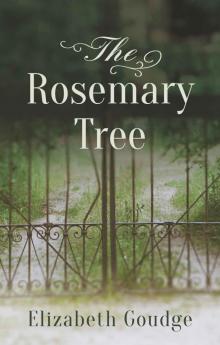 The Rosemary Tree
The Rosemary Tree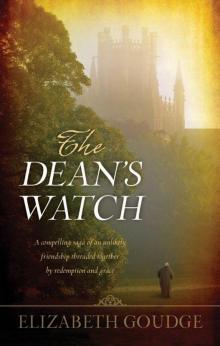 The Dean's Watch
The Dean's Watch Linnets and Valerians
Linnets and Valerians Gentian Hill
Gentian Hill B00DRI1ZYC EBOK
B00DRI1ZYC EBOK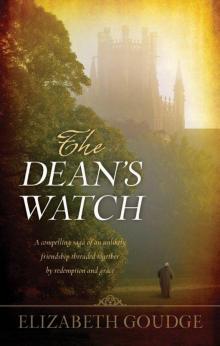 B008O6ZWTG EBOK
B008O6ZWTG EBOK The Scent of Water
The Scent of Water Pilgtim's Inn
Pilgtim's Inn Island Magic
Island Magic Pilgrim's Inn
Pilgrim's Inn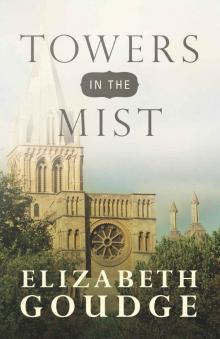 Towers in the Mist
Towers in the Mist Green Dolphin Street
Green Dolphin Street The Bird in the Tree
The Bird in the Tree The Child From the Sea
The Child From the Sea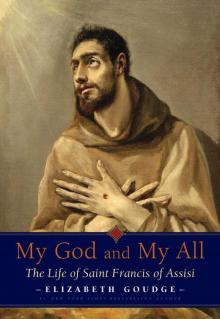 My God and My All: The Life of Saint Francis of Assisi
My God and My All: The Life of Saint Francis of Assisi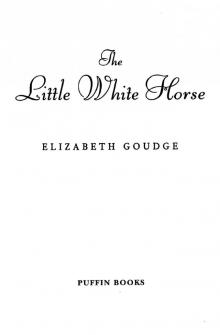 The Little White Horse
The Little White Horse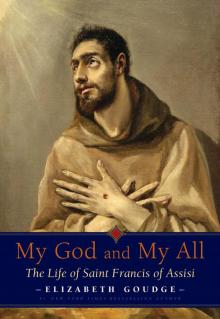 My God and My All
My God and My All B00CKXCNH8 EBOK
B00CKXCNH8 EBOK